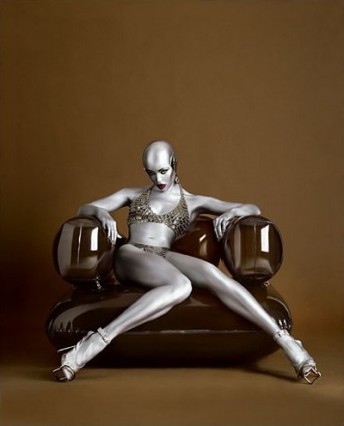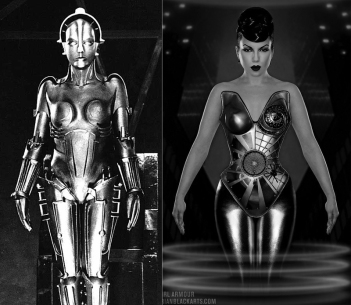Written by Brandon Arkell and Seth Gordon Little
Last time on the Lady League, the ladies encountered an obstacle course in the Kuiper Belt, but they were able to warp-drive their way back home to London with the help of Donna Destruction. At the landing pad, they met a mysterious, foreboding figure, Lady Fairfax, who scolded them over their tardiness.
 “Lady Fairfax, I apologise”, cried Julie. “You see, we encountered a sort of obstacle course in the Kuiper Belt—”
“Lady Fairfax, I apologise”, cried Julie. “You see, we encountered a sort of obstacle course in the Kuiper Belt—”
“—Mere congestion, Gentron!” replied Fairfax, rolling in on her wicker wheelchair, cane in one hand and gin and tonic in the other. “You know that MI6 agents encounter such notorious bottlenecks every day. You can’t possibly see yourself as special in the strive to defend the galaxy against the horrors which lie beyond our thin atmosphere—the microbes of Mars’s half-frozen crust, the virulent tar-women of Io’s angry volcanoes, the space-whales of Saturn’s engorged rings?” She paused and looked about her, then tapped her cane. “Wh-wh-where do you expect me to place my gin and tonic, girl??”
“May I, Lady Fairfax?” offered Rosalind graciously. Fairfax acquiesced, harrumphing indignantly as Rosalind reverently placed the gin and tonic on the spaceship console.
“Ladies”, cooed the venerable matron, “you are tardy for your next assignment. I have intelligence on a surreptitious figure rumoured to frequent the salons of Paris, the gay bathhouses of Seattle, the opium dens of Shanghai. It—for we do not yet know what shape it takes—traffics in something more precious than the methane riches of Titan itself. Humans!”
“Humans!” gasped the Lady League. Fairfax nodded soberly.
 “I—I don’t understand”, said Julie. “Why, we should have no trouble apprehending a mere slave-trader. We’ve done it before. Remember Slimeball and his power over slime? That’s how Rosalind joined the League. She was his captive aboard his Red Sea freighter, and we helped her escape.”
“I—I don’t understand”, said Julie. “Why, we should have no trouble apprehending a mere slave-trader. We’ve done it before. Remember Slimeball and his power over slime? That’s how Rosalind joined the League. She was his captive aboard his Red Sea freighter, and we helped her escape.”
“This isn’t some seaborne skirmish, Gentron”, thundered Fairfax, thumping her cane. She resumed her milder tone. “Due either to some sort of genetic mutation or medical procedure, this—entity—has acquired a symbiotic relationship with a material we all know too well—far too well. And it is to our detriment. Plastic!” The girls shrieked. “This being has commandeered the entire plastic manufacturing industry of Europe. It has so insinuated its way into the beauty and fashion marketplace that one cannot slide on a condom or spear one’s beans with a cafeteria spork without this—thing—turning it against one. The Continent’s brightest plastic surgeons have either disappeared or fallen into secrecy, avowing nothing for fear of retribution. I am afraid Britain is Europe’s last bastion of defense”, she said gravely in her rich, woody Home Counties accent. “This thing, it seems to control certain people. It targets beauties—those who have fallen under the knife, as it were. Supermodels. Actors. Homosexual fashion critics. The list goes on. Our best biophysicists cannot crack this one, girls. Earth—the solar system—is at risk of falling prey to this fiend’s wiles. It has evaded my smartest agents, some of whom never returned from their missions. I fear the worst for them. I fear that they have become a part of its shapeless morass.”
“Fairfax, this is horrible!” cried Julie. “Why, it is inconsistent with the Lady League mission protocol to allow such a crime against humanity to be committed. What can we do to stop this—this creature?”
 “Nothing—but to hate plastic!” cried Fairfax. “You must waste no time. Take nothing of plastic with you—it is the warhead of this hideous fiend. You must rely on your own feminine prowess now more than ever. Rosalind Armour, you possess superhuman strength and near-indestructible skin. Donna Destruction, you can move objects with the power of your mind. And, Julie Gentron, with the power of your mind you can control all technology, including the arsenal of deadly weapons implanted within your body by extraterrestrial beings. Surely”, she said, focussing her bespectacled eyes on Julie, “as director of the MI6, I can rely on you ladies to fulfil the objectives of this mission?”
“Nothing—but to hate plastic!” cried Fairfax. “You must waste no time. Take nothing of plastic with you—it is the warhead of this hideous fiend. You must rely on your own feminine prowess now more than ever. Rosalind Armour, you possess superhuman strength and near-indestructible skin. Donna Destruction, you can move objects with the power of your mind. And, Julie Gentron, with the power of your mind you can control all technology, including the arsenal of deadly weapons implanted within your body by extraterrestrial beings. Surely”, she said, focussing her bespectacled eyes on Julie, “as director of the MI6, I can rely on you ladies to fulfil the objectives of this mission?”
“We will do everything in our power to smoke this fox out of its hole and put an end to it”, said Julie, “even if it requires digging our bare, hangnailed fingers into that hole.”
“Beautiful. You will commence your assignment forthwith by escorting famed New York fashion critic Simpson Oswald to his next fashion show”, said Fairfax, cringing slightly at the name. “He boasts a number of friends in the industry, but, recently, he has acquired a few enemies, so we have reason to suspect he is target number one for this—this—plastic demon. Yes, I know that the pansies can be rather flakey and out-of-touch with reality, but you, Julie, are wearing one of his creations”, she revealed, grabbing the gin-and-tonic back from the spaceship console.
“Really?” cried Julie, scanning her shapely physique up and down. It was a sheer, form-fitting, silvery-metallic suit which covered everything but her face, and was implanted with myriad wires and electrodes which channelled and amplified her thought patterns. Unbeknownst to Julie, the electronic armoury embedded within the suit was the work of the galaxy’s best British engineers–its true powers remained a sinister secret. She wondered at the thing she was wearing, Who am I? What am I?
“What about me??” cried Donna.
 “You’re wearing nothing but a leftover tarp from last season’s Halloween sales rack at The Bay”, said Rosalind peremptorily.
“You’re wearing nothing but a leftover tarp from last season’s Halloween sales rack at The Bay”, said Rosalind peremptorily.
“But it’s vintage!” cried Donna, “and it goes with my complexion! Doesn’t it?” There was an awkward pause as everybody else looked at her.
“Enough small talk!” said Fairfax impatiently, waving away Donna with her gin and tonic. “Ladies, you will escort this Oswald to his next show in Paris. As I have stated, he is most likely the fiend’s next target. But beware the plastic demon’s wiles. I warn you. It is as sly as a snake in grass, and it owns every blade.” At this, Julie knew exactly what to do.
“Lady League”, cried Julie, “unite!” The League spread their legs in a buffalo stance and joined fists—which included Lupa’s fin—and a beam of super-powered lady plasma shot forth, illuminating London’s dank, dirty nighttime skyline. The girls were hot and ready to cream that plastic bitch.
Stay tuned for the next instalment to find out what the Lady League do with their legs.

